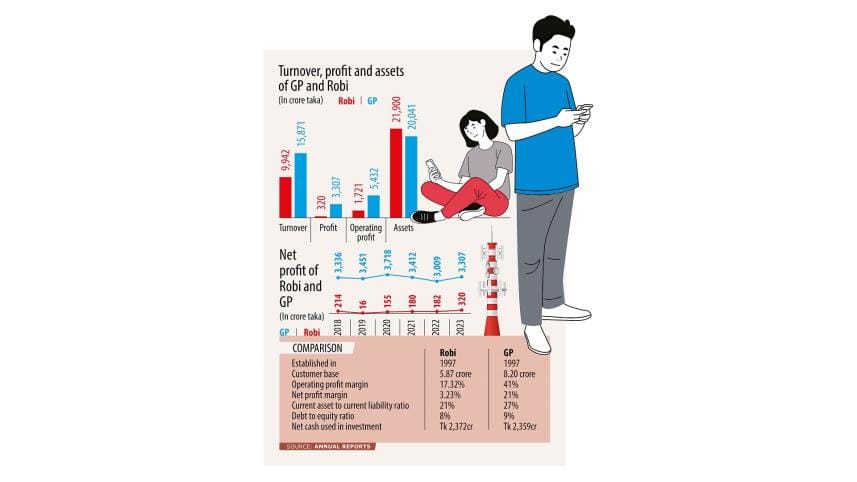How GP makes more money than Robi

The profit margin of Grameenphone Ltd was around seven times more than that of Robi Axiata Ltd in 2023.
The margin of the largest mobile phone operator in Bangladesh was 21 percent last year, way higher than 3 percent logged by the second-largest carrier, their financial reports showed.
The profit margin represents a company's profitability out of its total sales.
Although the customer base of Robi is lower than GP, it needed to shell out almost an equal amount to market products and services and maintain the vast network. This drives up its costs compared to revenue, bringing down the profit margin.
The operator's profits in proportion to assets and equity also lagged GP's.
Robi told The Daily Star that the profit margin was low but it was steadily growing while the overall profit soared along with the revenue.
The company's profit climbed 75 percent year-on-year to Tk 320 crore in 2023. GP logged a profit of Tk 3,307 crore last year, an increase of 9.9 percent.
"The overall tax structure in the telecommunications sector is also not favourable. The way it is structured, the smaller you are, the higher the tax impact and the effective tax rate," Robi said.
According to the carrier, the telecommunication business is a matter of scale: as companies get bigger, their operating cost gets lower.
"As a growing company, Robi is trying to achieve that scale despite several macroeconomic and policy challenges."
Incorporated in 1997 under the brand name Aktel, it was rebranded as Robi and the company changed its name to Robi Axiata. In 2016, it merged with Airtel Bangladesh.
GP also began its journey in 1997.
Robi also has to maintain an almost identical network coverage with a view to offering competitive network quality and service and putting in place a similar distribution channel to run the operation.
These essentially translate into an identical level of operational expenditure like the market leader, it said.
GP's costs accounted for 66 percent of revenue while it is more than 90 percent for Robi.
An analysis of the financial reports of the two companies showed Robi's fixed assets are larger than its rival and the number of employees is also higher. Therefore, it needs to spend more.
Robi's non-current asset was Tk 20,303 crore at the end of 2023 while it was Tk 17,511 crore for GP.
Due to the higher fixed assets, Robi's depreciation costs for property, plants, and equipment, were higher at Tk 1,578 crore compared to Tk 1,364 crore of the market leader.
The fixed costs in the telecom business are almost the same for every operator and the expenditure declines when a firm has a larger customer base.
Moreover, the industry requires a significant investment every year. On average, 20 percent of its retained earnings are reinvested in terms of capital expenditure, the operator said.
"With the commitment to serve users with the best-in-class data network, we continuously invest to modernise the network and carry out upgradation with the latest equipment, enabling the deployment of the newly acquired spectrum."
In the previous years, Axiata's investment in Bangladesh was at par. However, with a relatively longer asset retirement policy, Robi's residual asset value is relatively higher.
In 2023, the number of employees was 1,277 at GP against Robi's 1,446.
Robi's employee productivity ratio per month was Tk 57 lakh compared to Tk 1.03 crore of the market leader.
Robi explained the employee productivity ratio of a company depends on multiple factors.
Several large functions and the IT sector of Robi are not outsourced. Rather, they are taken care of in-house. So, the employee productivity ratio is low, it added.
GP covers its 8.20 crore subscriber base through 4G sites numbering 21,200. This means one site serves 3,867 users on average. Robi has employed 16,814 such sites to cater to 5.87 crore customers. This shows that one 4G site covers 3,491 users.
This shows that the market leader is providing services to a higher number of customers through its sites than Robi.
GP's current asset to current liability ratio, which measures a company's ability to pay short-term obligations or those due within one year, was 27 percent against 21 percent of its nearest competitor.
Grameenphone officials declined to comment on its performance in various indicators in comparison to Robi.
Yesterday, GP shares closed down 0.62 percent to Tk 224.40 on the Dhaka Stock Exchange. Robi's shares fell 2.20 percent to Tk 22.20.




 For all latest news, follow The Daily Star's Google News channel.
For all latest news, follow The Daily Star's Google News channel.
Comments